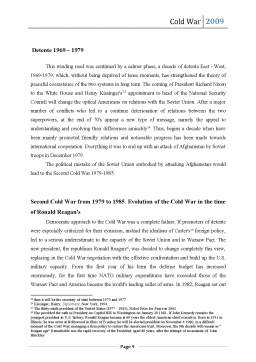Extras din proiect
Cold war or the world between a missed pace and an undeclarated war (1945-1990)
Terminology
In diplomatic terms there are three types of war:
- Cold War: it’s especially use to describe the relationship between the USA and the USSR: they never directly fought each other, but they fight by the intermediary of poorer countries under their influence.
- Warm War: The countries negotiate, there is still a chance that war doesn’t occur, but armies, navies etc are mobilized and war plans are already prepared.
- Hot War: This is the warfare, the armies are fighting.
When a conflict between major powers ending in more or less than a compromise, usually it is followed by another confrontation. That happened at the end of the Second World War, about which Italian historian Calvocoressi said that had the most remarkable consequence of its "Cold War". This is therefore a new term appeared to characterize a paradoxical state of international relations in the second half of the twentieth century, namely the 45 years that mankind has been "between a missed peace and an undeclared war” , to resume the expression used by Professor Ioan Ciupercă.
Paternity for use of the term Cold War, immediately after the global conflict, is journalist and American journalist Walter Lippman (1889-1974). He used the phrase cold war since 1946. Subsequently, in April 16 1947, the financial advisers of President Franklin D. Roosevelt, Bernard Mannes Baruch, characterize the state of international relations during a speech at Columbia, North Carolina, as the Cold War. So it is not an actual conflict, classic, but rather an expression on diplomatic and strategic, if French political scientist Jean Francois Revel is right.
However, Thomas Parish in "Encyclopedia of the Cold War, the Cold War is defined as "a general term for political conflict, ideological, strategic and military after 1945 between the western allies - led by the United States - on the one hand and the Soviet Union and other Communist countries, on the other hand. In reality, however, the term has a long history although little known, dating from XIV century, when Prince Juan Manuel, regent of Castile and León, applied to the battle between Spanish Christians and Moors. Prince wanted to say that, unlike wars "hot" or officially reported, "Cold War" begins without a declaration of war and ends without a peace treaty.
Framework. Perspective on the Cold War. Descriptive analysis
This strange phenomenon of the twentieth century, in which a conflict without a declaration of war begins and ends without signing a peace treaty, has its origins in the oddities of the Second World War.
At the end of the Second World War it was remaining, apparently five big powers: United States, United Kingdom, Soviet Union, China, and France. In reality, the postwar world was bipolar, organized around two big powers: Soviet Union and United States.
The defeat of Nazi Germany and Japan meant the disappearance of the reason which the Great Powers allied. The mistrust was installed between the winners, and the two groups of countries which were face to face, having led, the West - the United States, Communist countries or in the process of communization - Soviet Union.
United States of America were at the peak power: came out of a war which it had fought on their territory, with the economy in full swing, and all European countries, including USSR had debts to them. United States leaded global business and controlled International Monetary Fund. They assured the supremacy of the Bretton Woods agreements (1944), when all of Western currencies were relative to the american dollar. They coordinated Western Europe, where they had millions of soldiers and exclusive ownership of the atomic bomb to ensure the military supremacy. Near the United States, Canada with great economic power was a true arsenal. She had an aerospace industry, chemical and major shipyards.
The Soviet Union received support during the war, increasing its military strength. They wined enormous prestige behind the great battles and sacrifices they had made while the war is conducted on its territory and they understand to take advantage of it. After the war they gained a lot of territories and wanted to have access to "warm sea" (among the Mediterranean Sea) and to occupy a buffer zone pro-Soviet. This will be achieved thanks to Eastern Europe Army Red presence. Stalin put on this territory and part of Central Europe 11.000 soldiers.
Cold War (1947-1991) was an open confrontation, nonmilitary (although it caused the arms race) and limited, which developed after World War II between two groups of countries which had ideologies and political systems diametrically opposed. In one group were:
- USSR and its allies, who are also called Oriental or Eastern Bloc; the other group includes
- U.S. and their allies, also called Western or Western bloc.
At the military-political level was a confrontation between:
- NATO (North Atlantic Treaty Organization); and
- The Warsaw Pact.
At the economic level, was a confrontation between:
- Capitalism; and
- Socialism.
At the ideological-political level, was a confrontation between:
- The Western liberal democracies (so-called "free world," "open society"); and
- Totalitarian communist regimes (so-called "closed society").
In terms of intelligence, was a confrontation between:
- Services Western "intelligence" (primarily the U.S., CIA, NSA, but also British, German, French, Italian, etc.); and
- Political police of the communist regimes (above all, the KGB, but Security, Stasi, etc.).
Preview document
Conținut arhivă zip
- Cold War.doc






































